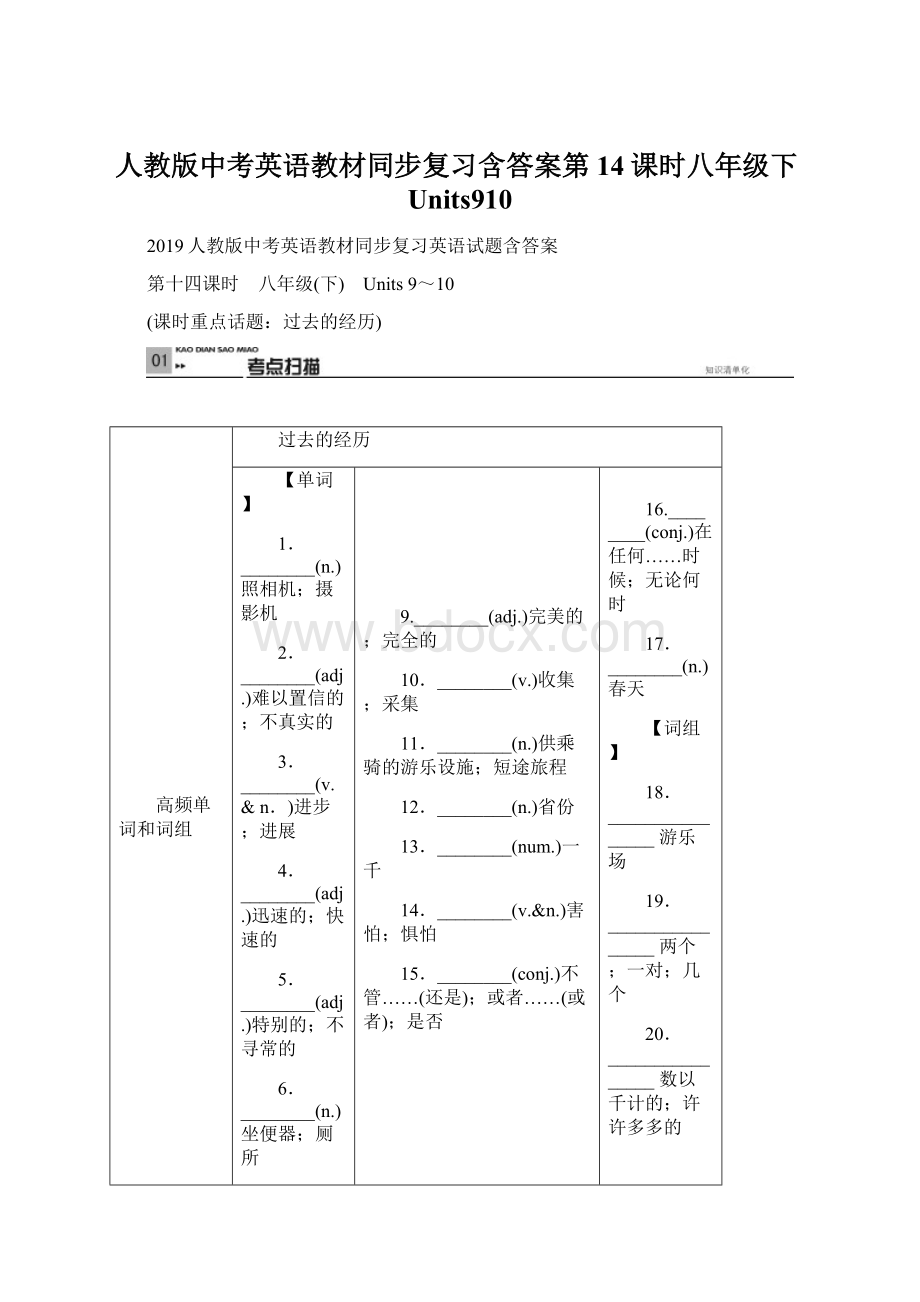人教版中考英语教材同步复习含答案第14课时八年级下Units910.docx
《人教版中考英语教材同步复习含答案第14课时八年级下Units910.docx》由会员分享,可在线阅读,更多相关《人教版中考英语教材同步复习含答案第14课时八年级下Units910.docx(19页珍藏版)》请在冰豆网上搜索。

人教版中考英语教材同步复习含答案第14课时八年级下Units910
2019人教版中考英语教材同步复习英语试题含答案
第十四课时 八年级(下) Units9~10
(课时重点话题:
过去的经历)
高频单词和词组
过去的经历
【单词】
1.________(n.)照相机;摄影机
2.________(adj.)难以置信的;不真实的
3.________(v.&n.)进步;进展
4.________(adj.)迅速的;快速的
5.________(adj.)特别的;不寻常的
6.________(n.)坐便器;厕所
7.________(v.)鼓励
8.________(adj.)社会的
9.________(adj.)完美的;完全的
10.________(v.)收集;采集
11.________(n.)供乘骑的游乐设施;短途旅程
12.________(n.)省份
13.________(num.)一千
14.________(v.&n.)害怕;惧怕
15.________(conj.)不管……(还是);或者……(或者);是否
16.________(conj.)在任何……时候;无论何时
17.________(n.)春天
【词组】
18.________________游乐场
19.________________两个;一对;几个
20.________________数以千计的;许许多多的
21.________________
一方面……另一方面……
22.________________全年
周围环境
【单词】
1.________(n.)院子
2.________(adj.)甜蜜的;甜的;含糖的
3.________(n.)记忆;回忆
4.________(n.)分;分币
5.________(n.)熊
6.________(adj.)软的;柔软的
7.________(v.&n.)检查;审查
8.________(v.)清理;清除
9.________(n.)卧室
10.________(v.)拥有;有
11.________(n.)铁路;铁道
12.________(v.)离开;
分开
13.________(adj.)诚实的;老实的
14.________(n.)家乡;故乡
15.________(adv.)现在;现今;目前
16.________(v.&n.)搜索;搜查
17.________(prep.)在(其)中;……之一
18.________(n.)羞耻;羞愧;惭愧
19.________(v.)将……认为;把……视为
20.________(v.)数数
21.________(n.)百年;世纪
22.________(prep.)与……相对;在……对面 (adj.)对面的;另一边的
23.________(n.)童年;幼年
24.________(v.)注视;仔细考虑
25.________(v.)拥有;抓住
【词组】
26.________________察看;观察
27.________________清理;丢掉
28.________________不再;不复
29.________________放弃、交出(尤指不舍得的东西)
30.________________至于;关于
31.________________说实在的
32.________________捐赠
33.________________处理
34.________________搜索
35.________________依据;按照
36.________________几乎;接近
词汇拓展
1.rapid→(副词)________
2.unusual→(反义词)________
3.peaceful→(名词)________
4.itself→(主格)________→(名词性物主代词)________
5.German→(德国)________
6.safe→(名词)________
7.Indian→(印度)________
8.Japanese→(日本)________
重点句型
1.—________you________________toasciencemuseum?
你曾经去过科学博物馆吗?
—Yes,I________.是的,去过。
2.________________________________today.让我们今天去个不同的地方吧。
3.________________________technologyhasprogressedinsucharapidway!
科技以如此迅猛的方式发展真是令人难以置信啊!
4.________youlikeIndianfood
,WesternfoodorJapanesefood,________________itallinSingapore!
无论你是喜欢印度食品、西方食品还是日本食品,在新加坡你全部都能找到!
5.________might________________________________toazoowhenit'sdark.天黑的时候去动物园似乎很奇怪。
6.________________________you________thebikeoverthere?
那边的那辆自行车你买多久了?
7.________________it________hisfourthbirthday.自他四岁生日起,他就拥有它了。
8.Asforme,Ididn'twanttogiveupmyfootballshirts,but,________________________,I________________forawhilenow.至于我,我不想放弃我的足球衫。
但说实话,我现在已经有一段时间没有踢足球了。
9.________peoplestillliveintheirhometown.However,________mayonlyseeit________________________ayear.有些人仍然住在家乡。
然而,另一些人可能一年只能回家乡一两次。
10.________willthey________________themoneyyouraisefromthesale?
他们将怎样处理通过卖东西筹来的钱?
核心
语法
1.现在完成时Ⅱ(含been,ever和never)
2.现在完成时Ⅲ(含since,for)
Ⅰ.听对话及问题,选择正确的答案。
()1.A.Totheamusementpark.B.Tothespacemuseum.C.Tothewaterpark.
()2.A.Hisparents. B.Hisclassmates.C.Hisfriends.
()3.A.7years.B.18years.C.13years.
()4.A.Mary.B.Mike.C.Jim.
()5.A.Five.B.FourC.Three.
Ⅱ.听短文,选择正确的答案。
()6.WhendidJennywritethelettertoLucy?
A.OnNovember25th.B.OnDecember5th.C.OnDecember24th.
()7.WhendidJennyleaveLucy?
A.Aboutfourweeksago.B.Ab
outtwomonthsago.C.Aboutoneyearago.
()8.WhereisJennyworkingnow?
A.InNewYork. B.InLondon.C.InWashington.
()9.WhatdoesJennythinkofhernewjob?
A.Interesting. B.Easy.C.Bad.
()10.Whycan'tLucygotoJenny'sChristmasparty?
A.Sheisbusywithherwork.
B.Shehastovisithergrandfather.
C.Hergrandfatherwillcometov
isitherfamily.
1.Ontheonehand,morethanthree__quartersofthepopulationareChinese,soyoucansimplyspeakPutonghuaalotofthetime.一方面,超过四分之三的人口是华人,因此大部分时间里你只要讲普通话就足够了。
Ⅰ.单项选择。
( )1.(2015·南充模拟一)About________ofthetea
chersintheschoolwereborninthe________.
A.two-thirds;1980B.two-thirds;1980s
C.two-third;1980D.two-third;1980
( )2.(2015·兰州)________ofthelandinthatdistrictiscoveredwithtreesandgrass.
A.FifthtwoB.TwofifthC.FifthsecondD.Twofifths
( )3.Therearefiftystudentsinourclass,________ofus________football.
A.twothird;likesB.twothree;likeC.twothirds;likesD.twothirds;like
Ⅱ.根据汉语意思完成英语句子。
4.六分之五的食物已经变坏了。
________ofthefood________gonebad.
5.我们学校五分之三的学生是男生。
About________ofthestudentsinourschool________boys.
threequarters意为“四分之三”,是分数的一种表达方法,也可以表示为threefourths。
【拓展】 英语中分数的表达方式:
分子用基数词,分母用序数词。
当分子大于1时,分母须用复数形式。
当分数作主语时,谓语动词要根据分数词后面的名词来确定:
“分数+of+不可数名词”作主语时,谓语动词用单数形式;“分数+of+复数可数名词”作主语时,谓语动词用复数形式。
如:
OnethirdofthegirlsinourclasslikeDuanLinxi.我们班里三分之一的女生喜欢段林希。
Threequartersoftheinformationistrue.四分之三的信息是真实的。
2.WhetheryoulikeIndianfood,WesternfoodorJapanesefood,you'llfinditallinSingapore!
无论你是喜欢印度食物、西方食物或者日本食物,在新加坡你全部都能找到!
Ⅰ.单项选择。
( )1.(2014·广安)—Doyouknow________?
—Sorry,Idon'tknow.
A.ifshewillcometotheconcertornot
B.whethershewillcometotheconcertornot
C.ifwillshecometotheconcert
( )2.(2013·资阳)—WhydidMissWanglooksoworriedwhenwesawher?
—Becauseshewondered____________.
A.wheredidtheotherstudentsgo
B.whatherstudentshavedoneduringthetrip
C.whenwouldthestudentscome
D.whetherherstudentshadwonthematch
()3.(2015·青岛)Iwonder________.
A.howwillyoucelebrateThanksgiving
B.thattheWaterFestivalisreallyfun
C.whatdopeopleeatontheMid-AutumnFestival
D.whetheryouwillmakeresolutionsonNewYear'sDay
Ⅱ.根据汉语意思完成英语句子,每空一词。
4.不管你是去还是留,都要在8点前给我打电话。
________yougo________stay,youshouldcallmebefore8:
00.
5.你知道他们明天是否前往北京吗?
Doyouknow________theyareleavingforBei
jingornottomorrow?
whether作连词,意为“不管……;或者……;是否”。
用以引入选择的可能性,引导的句子通常作状语。
whether…or…意为“不管……还是……”。
如:
Whethershewinsorloses,thisisherlasttournament.不管她是赢还是输,这是她的最后一次锦标赛。
【辨析】 whether与if
当表示“是否”时,两个词可以互换。
其区别是:
(1)与orno
t连用时,只能用whether,而不用if。
如:
Idon'tknowwhetherhewillcomeornot.我不知道他是否会来。
(2)引导宾语从句,且从句位于句首表示强调时,只能用whether,而不用if。
如:
WhetherhewillcomeIamnotsure.他来不来我不确定。
(3)从句作介词宾语时,只能用whether,而不用if。
如:
Itdependsonwhetheritwillbefine.那取决于天气好不好。
(4)在动词不定式之前时,只能用whether而不用if。
如:
Wehaven'tdecidedwhethertostay.我们还没有决定是否留下。
(5)引导主语从句、表语从句时用whether而不用if。
如:
Whethertheywinorloseisallthesametome.他们是赢是输对我都一样。
3.Nowadays,millionsofChineseleavethecountrysidetosearch__forworkinthecities.现在,数百万的中国人离开了农村到城市去寻找工作。
Ⅰ.单项选择。
( )1.(2015·武威)—MrWang,canyoutellme______?
—http:
//willhelpyou.
A.whatIcandotohelpyou
B.wherecanIgetmyscoreforthisexamination
C.whyIneedsomehelp
D.whereIcansearchfortheinformationabouteducationinourprovince
()2.(2014·安徽)Rosefinishedherstudyintheuniversityandwentto________agoodjob.
A.takeafterB.lookafterC.careforD.searchfor
()3.Theyspentthewholeday________thewoods________thelostboy.
A.searching;forB.looking;forC.searching;withD.tosearch;for
Ⅱ.根据汉语意思完成英语句子,每空一词。
4.他在不同的商店寻找工作。
He________________workatdifferentstores.
5.他翻遍了自己的口袋寻找钥匙。
He________hispocket________hiskeys.
(1)search作及物动词,意为“搜寻、搜索、搜查”,其后既可以接人又可以接物,接人时表示“搜某人的身”;接物时表示“搜查某处或某物”。
如:
Theysearchedhimbutcouldn'tfindanything.他们搜他的身,但是没有发现任何东西。
(2)searchfor指“寻找某人或某物”,多指丢失的人或物。
如:
ImustsearchforthatlostmoneyuntilIfindit.我必须去寻找那些丢失的钱,直到找到为止。
(3)searchsb.(sth.)for指“搜查某人或某处以寻找……”。
如:
Wesearchedthewholecityforthelostoldman.我们搜查整个城市去寻找这个丢失的老人。
4.Mostofthechildreninmytimelikedtoplaytogetherunderthatbigtree,especiallyduringthesummerholidays.在我那个年代的大多数孩子喜欢在那棵树下一起玩,尤其是在暑假期间。
Ⅰ.单项选择。
( )1.(2014·德州)Thebasketballmatchwasreallyfantastic,________whenShu-HowLinscoredinthelastsecond.
A.probablyB.especiallyC.exactlyD.mostly
( )2.(2014·东营)OnMarch8th,FlightMH370wentmissing.Thenewsbroughtgreatsadnesstous,________thefamiliesofthepassengers.
A.evenB.onlyC.alsoD.especially
( )3.(2013·哈尔滨)ThecityofHarbinisbeautifulalltheyearround,________inwinter.Icelanternsdecoratestreetsandattractplentyoftourists.
A.especiallyB.generallyC.probably
Ⅱ.用括号内所给单词的适当形式填空。
4.IwanttotraveltoShandongProvince,________(especial)toMountTai.
5.Theoldmanissolonelythathehopestoknowaboutsomething________(special)everyday.
(1)especially意为“尤其;特别;格外”。
多用于陈述某一事实后,要列举一个具有代表性的例子作进一步强调时使用,其后接名词、介词短语、从句等。
如:
Wewanttoinvitesomefriends,especiallyJimandJohn.我们想邀请几个朋友,尤其是吉姆和约翰。
(2)especially用作副词,还可以修饰动词、形容词或副词,强调程度。
如:
Weareespeciallybusytoday.我们今天特别忙。
Iespeciallywanttoseethatfilm.我特别想看那部电影。
5.consider
Ⅰ.单项选择。
( )1.(2015·武威)Forourcomingvacation,why________goingabroadandseeingtheoutsideworld?
A.notconsiderB.toconsiderC.don'tthinkD.notthink
( )2.(2014·云南)—Mom,whynot________havinghamburgersinsteadofdumplings?
—Goodidea.I'llgetforyou.
A.practiceB.rememberC.forgetD.consider
( )3.Theyhavebeenconsidering________theproblem.
A.toworkoutB.workoutC.workingoutD.workedout
Ⅱ.根据汉语意思完成英语句子,每空一词。
4.他们正在考虑什么时候举办运动会。
Theyareconsidering________________________asportsmeeting.
5.我们的老师总把我们看做他的孩子。
Ourteacheralways________________________hischildren.
(1)consider用作及物动词,意为“注视;仔细考虑”。
后接名词、动名词形式、宾语从句或“疑问词+todo结构”。
如:
Pleasethinkovertoconsidertheproblem.请仔细考虑那个问题。
We'reconsideringmovingtocountryside.我们正在考虑搬到农村。
Weareconsideringwhetherwecanafforditornot.我们正考虑是否能负担得起它。
I'vebeguntoconsiderwhattodonext.我已经开始考虑接下来怎么做了。
(2)consider用作不及物动词,consider常用于“consider+sb./sth.(+as)+名词”结构或“consider+sb./sth.(+tobe)+形容词”结构。
如:
Weconsiderher(as)ourfriend.我们把她当作我们的朋友。
Theyconsiderthisidea(